It seems we can’t find what you’re looking for. Perhaps searching can help.


Tag: Shopify vs BigCommerce




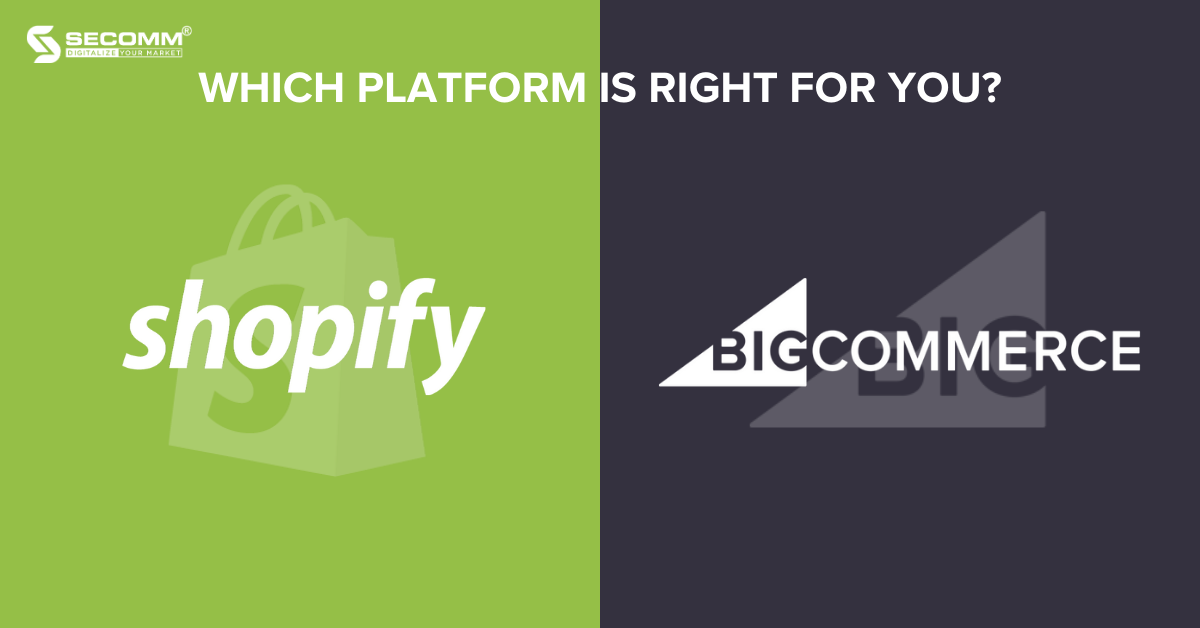
SHOPIFY VS BIGCOMMERCE: WHICH PLATFORM IS RIGHT FOR YOU?
In recent times, SaaS platforms like Shopify and BigCommerce have gained popularity thanks to the growing demand for eCommerce. While BigCommerce currently supports over 45 thousand active online stores globally, Shopify surpasses it with around 4.5 million active websites. Although Shopify and BigCommerce share typical features of SaaS platforms, there are notable differences between the two.
This article will compare the distinctions between Shopify and BigCommerce, providing valuable insights to help you, as a business make informed decisions quickly.
Learn more: Shopify Plus vs BigCommerce Enterprise
Shopify vs BigCommerce: Pros and Cons
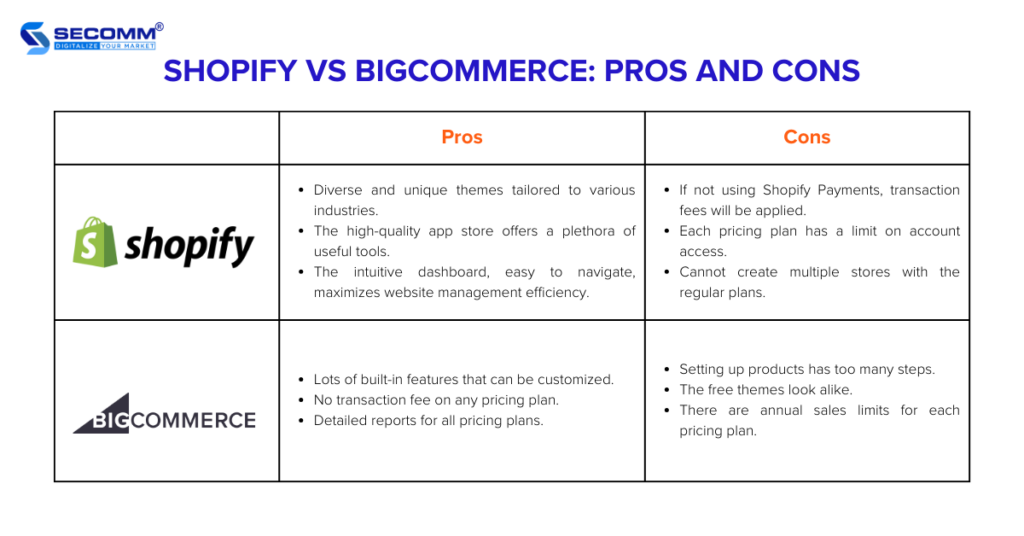
Shopify vs BigCommerce: So sánh nhanh
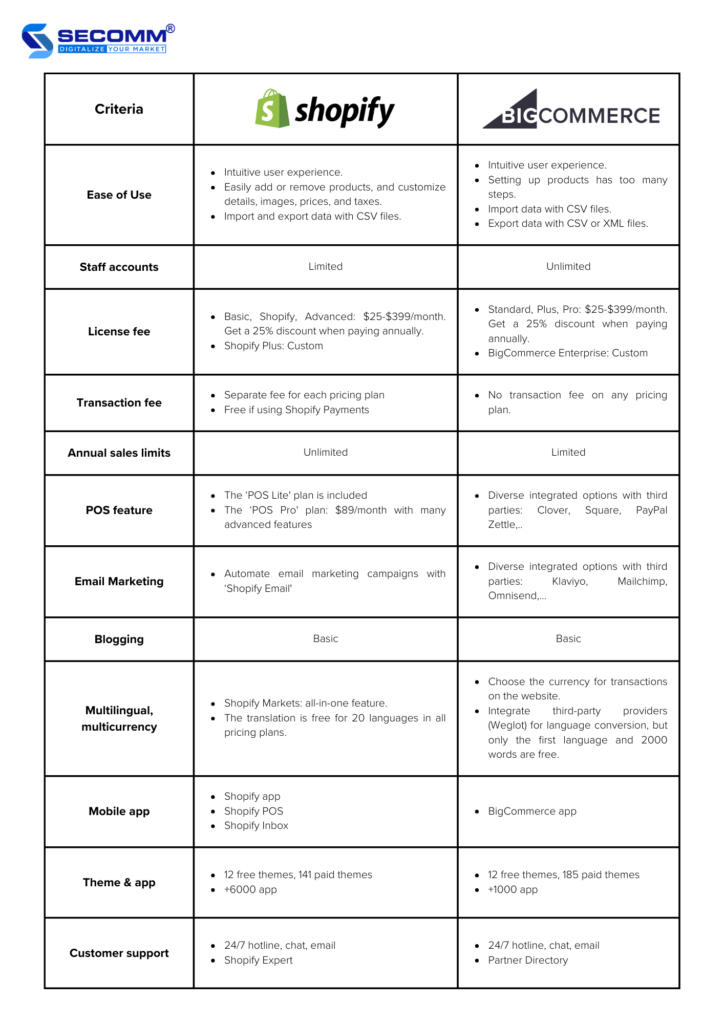
Shopify vs BigCommerce: Detailed Comparison
Ease of Use
New businesses often find Shopify more user-friendly than BigCommerce when it comes to setup and usage. Adding or removing products, customization, and editing layouts on Shopify are all straightforward tasks.
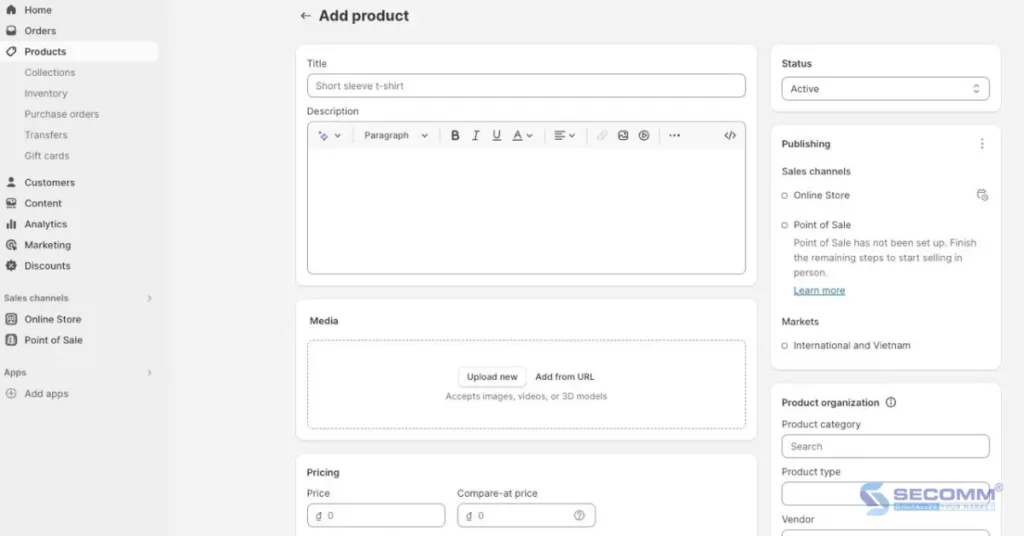
This doesn’t mean that the user experience of BigCommerce is less intuitive than the other. Both platforms are similar, providing drag-and-drop store editors, detailed documentation, and quick support. However, BigCommerce offers many built-in features that are expandable and customizable.
Users, though, may find themselves completing several different steps for each setup task, which can be overwhelming and time-consuming.
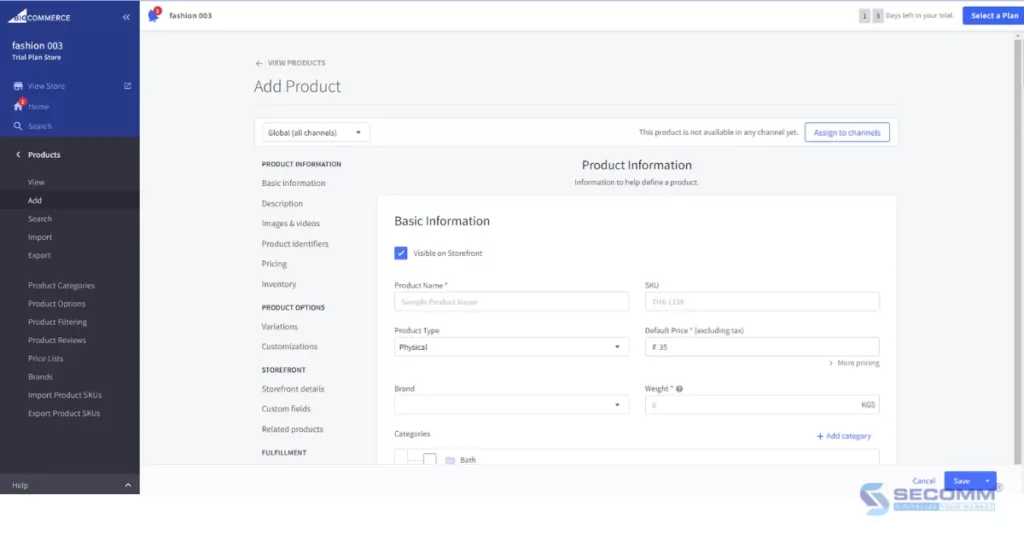
Staff Accounts
Shopify sets account staff limits for each pricing plan. Specifically, the Basic package allows 2 staff accounts, Shopify allows 5 staff accounts, and Advanced allows 15 staff accounts.
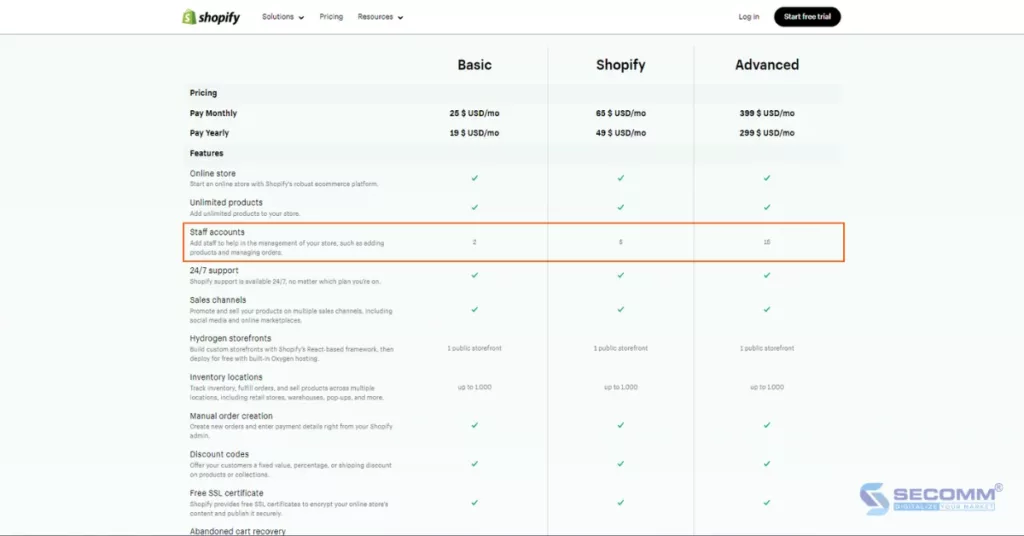
In this regard, BigCommerce has a significant advantage by providing unlimited account access for all solution packages. This flexibility can benefit businesses with many employees needing access to the eCommerce website system.
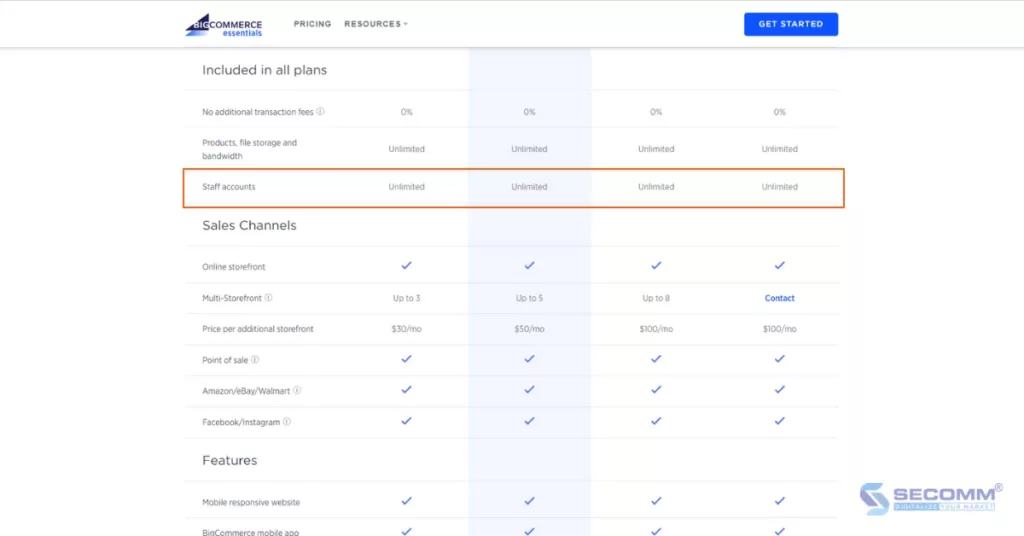
Pricing
- Pricing plans
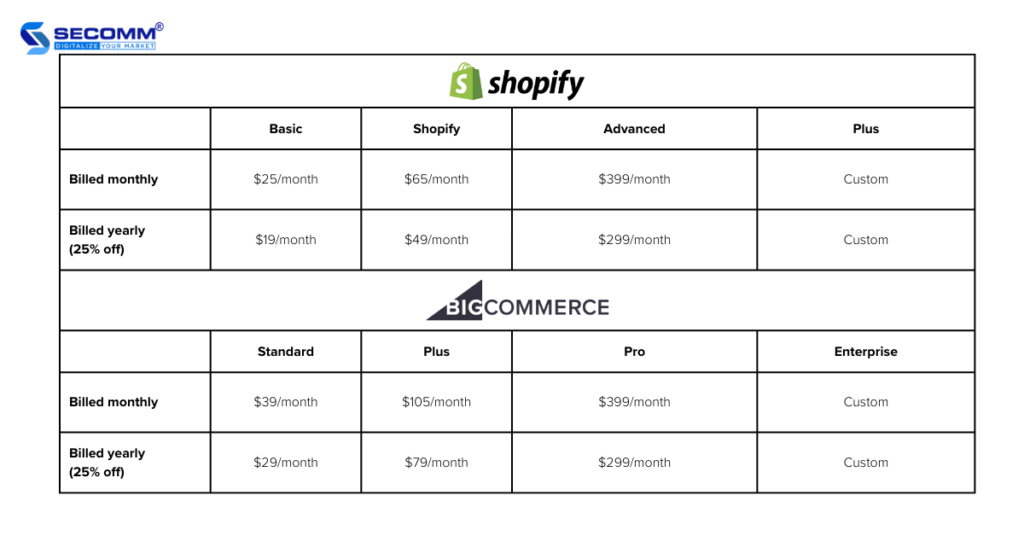
By using BigCommerce pricing plans, you can enjoy a 15-day free trial. The other offers a 3-day free trial for its 3 pricing plans, followed by a payment of only $1 per month for the initial 3 months. This gives you more time to experience the platform at a highly affordable cost.
- Transaction fee
The transaction fee is a drawback of Shopify. If you opt for third-party payment gateways, you’ll incur a transaction fee of 2%, 1%, and 0.5% for the Basic, Shopify, and Advanced plans, respectively. On the other hand, this fee is waived if you use Shopify Payments. However, Shopify Payments is limited to certain countries, some businesses may not have access. This, in turn, makes BigCommerce more appealing as it doesn’t impose transaction fees on any pricing plan.
Annual Sales Limits
BigCommerce sets annual sales limits to $50k for the ‘Standard’ plan, $180k for ‘Plus,’ and $400k for ‘Pro’, while the ‘Enterprise’ plan can be negotiated. To exceed these limits, you must upgrade to a higher pricing plan.
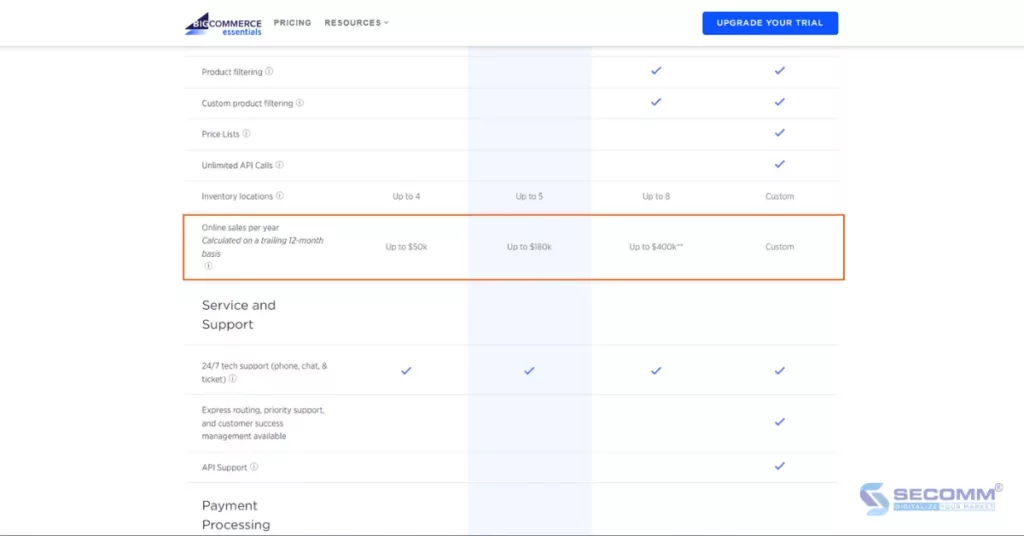
However, your business may not need the features offered in higher-tier plans and may be hesitant to pay additional fees for an upgrade. Therefore, the sales volume limit on the BigCommerce platform is a crucial factor that requires thoughtful consideration. In contrast, Shopify doesn’t impose any annual sales limits on any of its pricing plans.
Features
- Point of Sale (POS)
The POS feature isn’t limited to eCommerce transactions but also extends to traditional brick-and-mortar stores. Both BigCommerce and Shopify allow you to implement POS on mobile devices (smartphones, tablets) and other hardware (cash registers, barcode scanners).
To use POS with BigCommerce, you need to integrate with software like Clover, Vend, Square, PayPal Zettle, and others. Hence, if you are currently using a third-party POS system may appreciate the flexibility offered by BigCommerce.
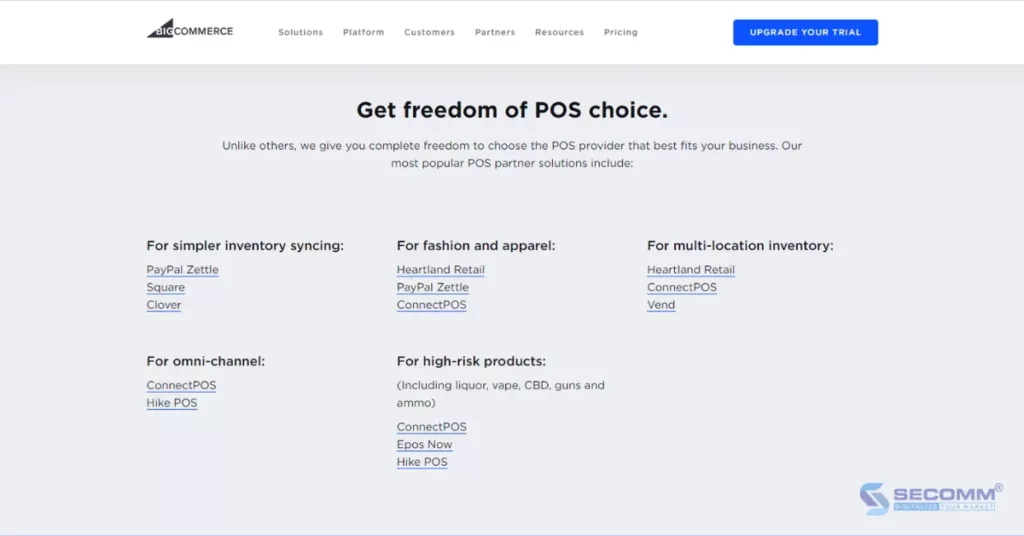
Conversely, Shopify offers built-in POS features, starting with the ‘POS Lite’ plan within its pricing plans. However, to access more advanced POS features, you can opt for the ‘POS Pro’ plan at $89 per month per location, added to the chosen pricing plan. If you choose the annual payment option, the ‘POS Pro’ plan is only $79 per month per location.
Shopify POS solution caters to diverse needs, including single-store transactions, multi-store transactions, event transactions, online and offline sales, as well as omnichannel operations.
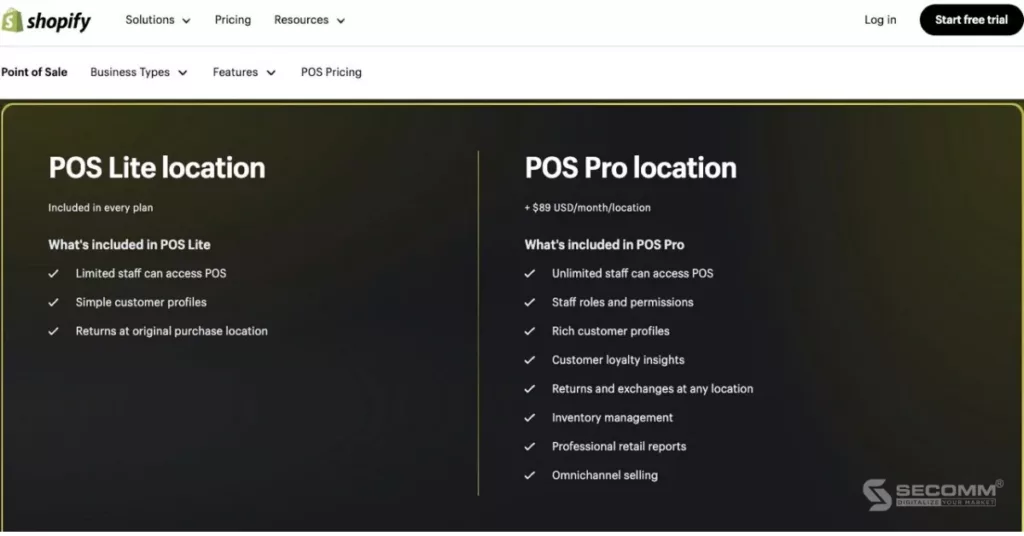
- Email Marketing
In eCommerce, email marketing is crucial when it comes to customer attraction and substantial sales growth. Hence, it’s a feature you should prioritize when selecting an eCommerce platform.
Beyond the Shopify POS solution, Shopify offers you the built-in Shopify Email feature, designed for Email Marketing campaigns and automating email processes (Welcome Email, Winback Email, Upsell Email).
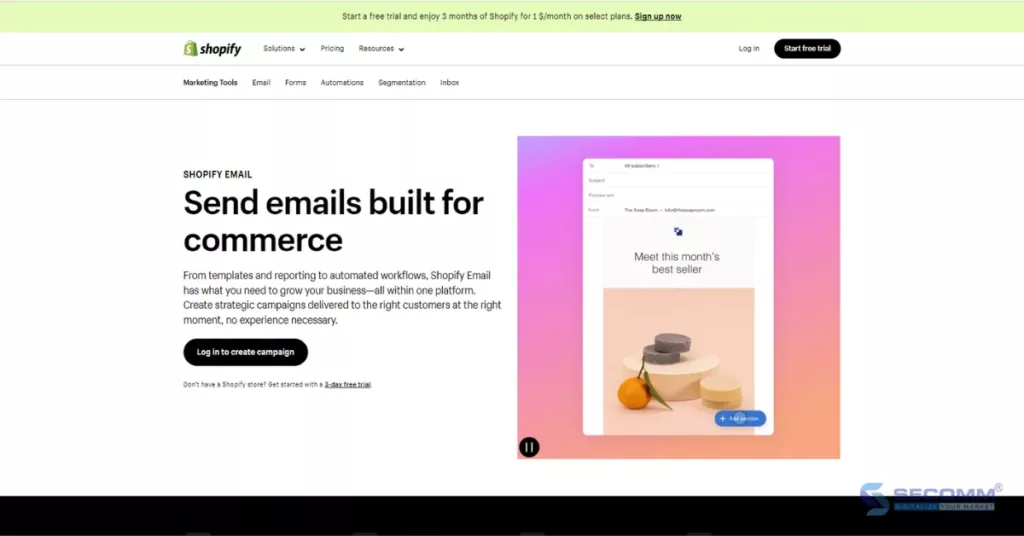
Meanwhile, for Email Marketing on BigCommerce, you need to integrate with third-party service providers like Klaviyo, MailChimp, Omnisend, and others.
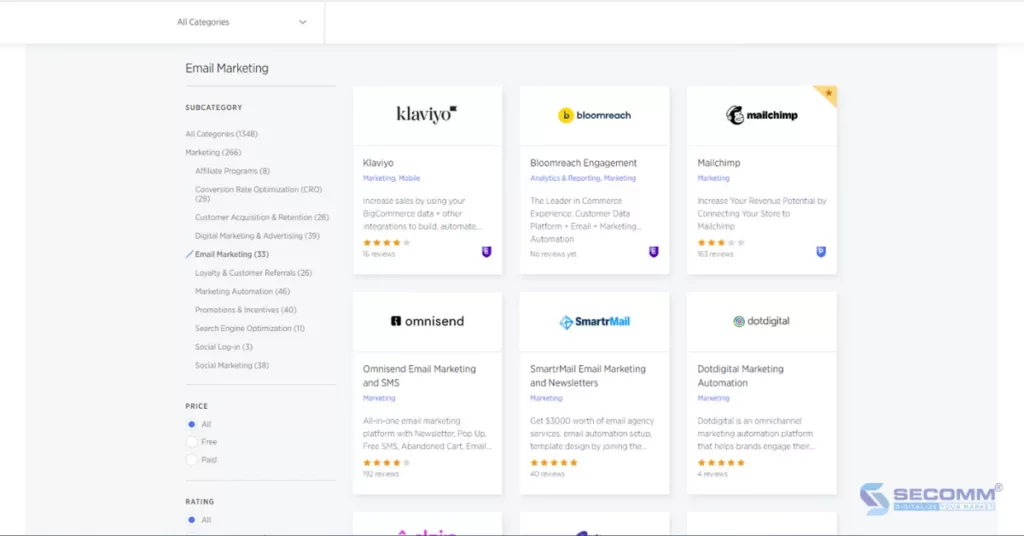
- Blogging
When you utilize blogging effectively, it can be one of the best sources to attract organic traffic. Both BigCommerce and Shopify come with built-in blogging features at a basic level, offering attractive templates that help you create SEO-optimized blog content to draw in potential customers. Moreover, you can seamlessly integrate with WordPress or other CMS platforms for more advanced blogging features
- Multilingual, multicurrency
Cross-border selling is currently a common goal for many eCommerce businesses. Fortunately, both Shopify and BigCommerce provide features and tools to help businesses expand into the global market
Shopify Markets, introduced in 2021, is a feature that allows you to select the specific markets you want to sell in. It’s an all-in-one feature that helps you centrally manage multiple local domains, languages, currencies, and payment gateways.
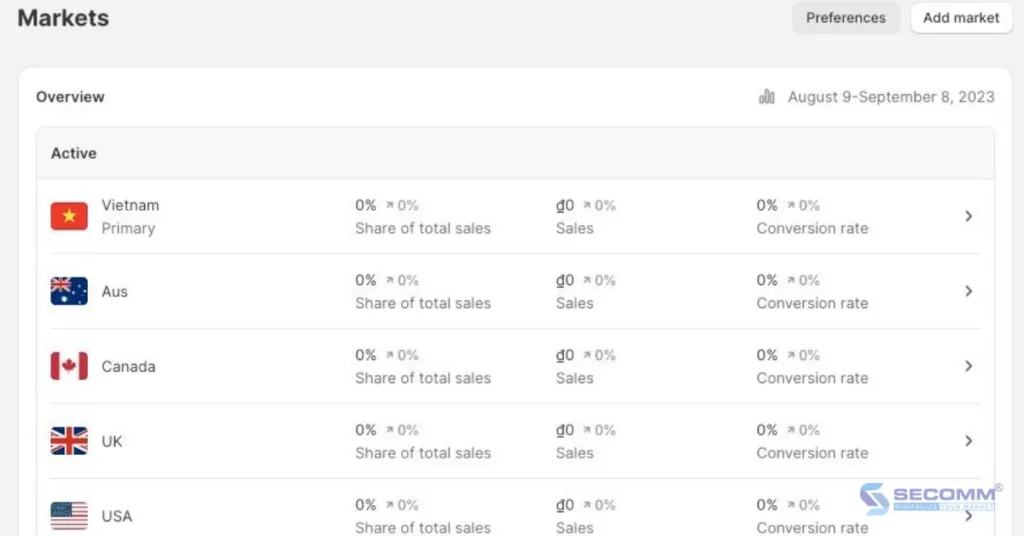
Plus, Shopify Markets utilizes the IP address of visitors outside the default ‘market’ that you previously defined to prompt them to select a location and the appropriate currency.
On the other hand, with BigCommerce, you can choose the currency for transactions on your eCommerce website instead of opting for a ‘market’ like Shopify. Additionally, the currency is automatically converted based on the customer’s IP address.
While language conversion capabilities are built into Shopify when the Shopify Markets feature is enabled, for BigCommerce websites, you’ll need to integrate with a third-party service to achieve the same, such as Weglot, which offers free conversion for 1 language and 2000 words. In contrast, Shopify provides free conversion for 20 languages across all pricing plans.
- Mobile app
While BigCommerce has only one app to help you manage sales, interact with customers, and access basic reports, Shopify you up to 3 apps to improve efficiency in eCommerce operations.
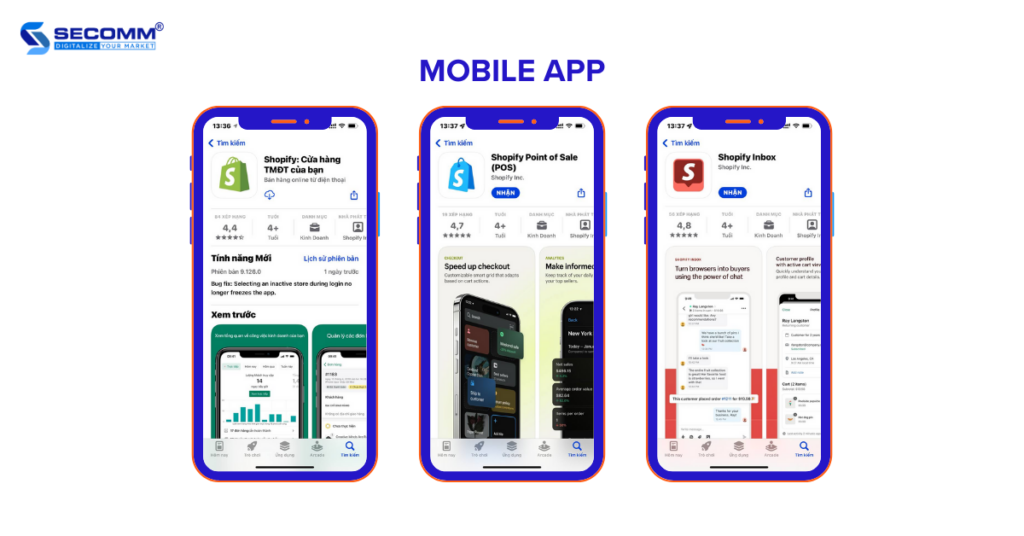
- Shopify: The main app for order and product management, along with viewing updated reports.
- Shopify POS: Manages online, offline, and omnichannel sales transactions.
- Shopify Inbox: Facilitates customer interaction, product sharing, and direct sales within the chat interface.
Themes & Apps
- Themes
Both BigCommerce and Shopify offer you a variety of free and paid themes. For BigCommerce, the platform provides 12 free themes, but in reality, there are around 5-6 distinct free themes as the layouts are quite similar. As for paid themes, BigCommerce has approximately 185 themes ranging from $150 to $400 per theme.
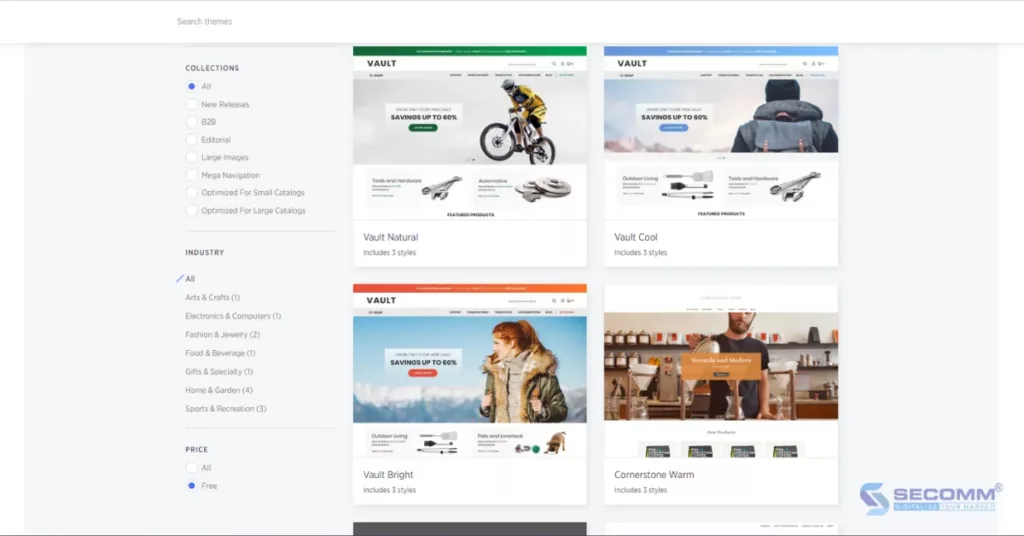
On Shopify, the platform offers 12 free themes and 141 paid themes with prices ranging from $170 to $380 per theme. Both Shopify and BigCommerce provide users with drag-and-drop theme editors to modify layouts, colors, fonts, and text sizes and add/remove elements and widgets.
However, Shopify’s themes, both free and paid, are widely favored for their modern and contemporary styles. Additionally, Shopify offers a diverse selection of fonts for you to choose from. In contrast, BigCommerce has around 8 font options.
- Apps
Alongside their built-in features, Shopify and BigCommerce both offer extensive app stores to help you optimize your eCommerce activities. Both app stores offer free versions of apps, but certain features may be limited. To access the full functionality, you’ll need to subscribe to the paid versions, which often involve monthly fees. The number of apps available on Shopify and BigCommerce differs significantly, with Shopify boasting over 6000 apps, while BigCommerce has over 1000.
Customer Support
In the process of deploying an eCommerce website, both BigCommerce and Shopify offer 24/7 support through hotlines, chat, and email. Plus, if you seek advice and support in addressing specialized issues related to technology, design, and marketing, BigCommerce provides Partner Directory services, while Shopify offers Shopify Experts.
Final Thoughts
Above are the comparisons between Shopify and BigCommerce. However, it’s challenging to determine which platform is the best in 2023 for developing an eCommerce website. The choice will depend on your specific needs and wants.
With years of experience advising and collaborating with numerous businesses both domestically and internationally on implementing eCommerce websites on both Shopify and BigCommerce, SECOMM has gathered valuable insights to help your business streamline your eCommerce development process, optimize your website performance, and swiftly generate conversions.
Contact SECOMM today or call directly at the hotline 028 7108 9908 for free and detailed consultations.
 2
2

 7,394
7,394

 0
0

 1
1
